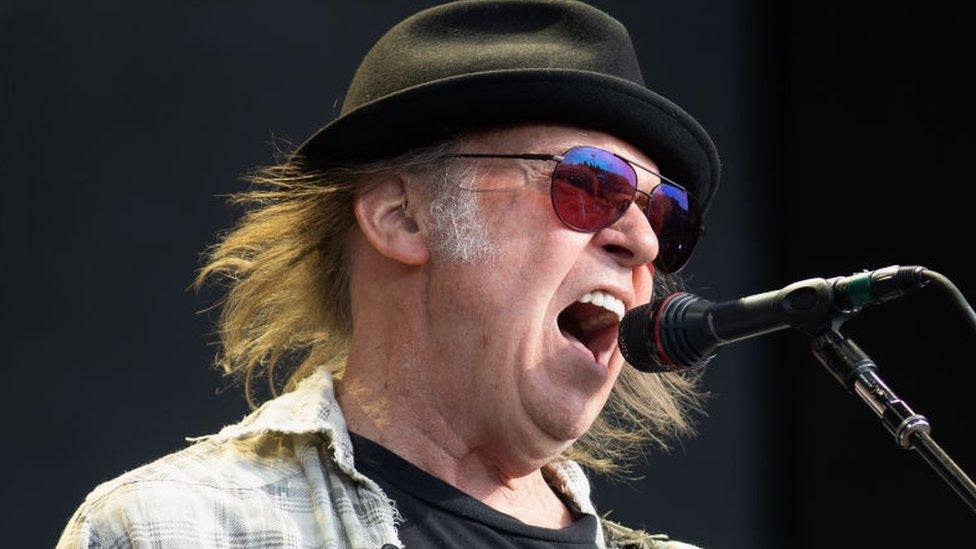Neil Young wants to quit Spotify over Joe Rogan's vaccine misinformation
- Published
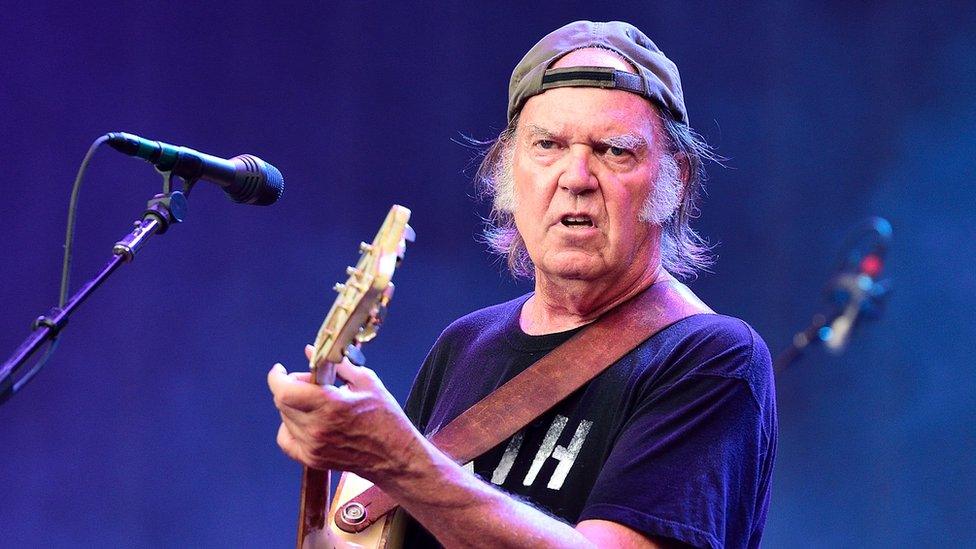
Young's comments came in an open letter to his management and record label
Neil Young has demanded that Spotify removes his music, due to vaccine misinformation spread by podcaster Joe Rogan on the streaming service.
"They can have Rogan or Young. Not both," wrote the star in a letter to his management and record label.
Rogan has been criticised for airing vaccine-sceptical views, and promoting debunked claims about treating Covid-19 with the anti-parasite drug ivermectin.
Spotify, which paid $100m for rights to the podcast in 2020, is yet to comment.
Young's comments came in an open letter, which was briefly posted to his Neil Young Archives website before being removed.
"I want you to let Spotify know immediately TODAY that I want all my music off their platform," he wrote.
"I am doing this because Spotify is spreading fake information about vaccines - potentially causing death to those who believe the disinformation being spread by them. Please act on this immediately today and keep me informed of the time schedule.
"With an estimated 11 million listeners per episode, JRE [the Joe Rogan Experience] which is hosted exclusively on Spotify, is the world's largest podcast and has tremendous influence," Young continued.
"Spotify has a responsibility to mitigate the spread of misinformation on its platform, though the company presently has no misinformation policy."
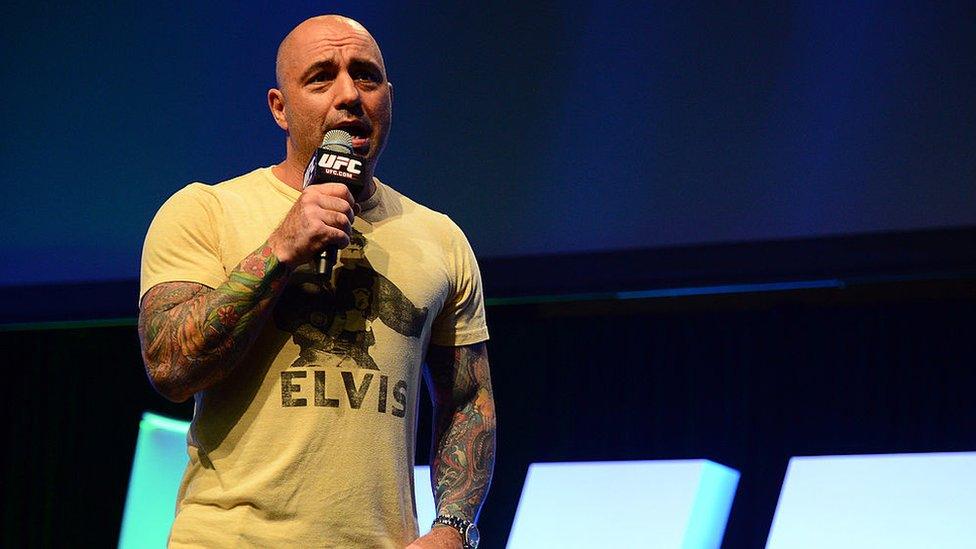
Joe Rogan, Spotify's most popular podcast host, often sparks controversy
Young is not the first person to raise concerns over the content of Rogan's podcast.
Last month, 270 doctors, scientists and healthcare professionals signed an open letter, external requesting that Spotify implement a policy for dealing with misinformation because of Rogan's "concerning history" in discussing the Covid-19 pandemic.
The letter cited an episode in which Rogan interviewed Dr Robert Malone, a virologist who worked on early research into the mRNA technology behind several Covid-19 vaccines, but who is now critical of the treatments.
Both men were criticised for promoting conspiracy theories, including the false claim that hospitals are financially incentivised to falsely diagnose deaths as having been caused by Covid-19.
Malone also incorrectly stated that getting vaccinated puts people who have already had Covid-19 at higher risk, and claimed world leaders had hypnotised the public into supporting vaccines, drawing parallels between the pandemic and the rise of the Nazi party in 1930s Germany.
Last year, before that episode was recorded, Rogan clarified that he was "not an anti-vax person".
"I believe they're safe and encourage many people to take them," he said, while refusing to back down on claims that young people did not "need" the vaccine.
The stand-up and TV personality also stressed that he should not be regarded a source of scientific advice.
"I'm not a doctor," he said. "I'm not a respected source of information, even for me."
'Boycott Spotify'
Spotify has removed controversial content in the past, including several episodes of Rogan's podcast featuring right-wing personalities, which were recorded before he signed his exclusivity deal with the service in 2020.
It has also removed music by bands with affiliations to neo-Nazi and white supremacist hate groups.
In 2018, the service announced a new policy around "hateful conduct," which led to music by artists accused of physical and sexual abuse being removed from its editorial and algorithmic playlists.
But the company reversed that policy three weeks later, stating in a blog post that while the policy against hate content would remain, it would not "play judge and jury" over artist's conduct.
The company has faced further criticism in recent months, after owner Daniel Ek revealed he had invested 100 million euros (£85.2 million) in the defence firm Helsing, which is said to be developing AI software to support military operations identify targets on the battlefield.
Several artists, including UK psychedelic musician Darren Sangita and German techno producer Skee Mask have pulled their music from Spotify, spearheading a small "Boycott Spotify" movement that has yet to be endorsed by any major artists.
As for Young, he has removed his songs from Spotify before - quitting the service, along with Apple Music and other streaming sites, in 2015 after stating their audio quality was not good enough.
At the time of writing, his music - including classic albums like Harvest and After The Gold Rush - is still available on Spotify.

Follow us on Facebook, external, or on Twitter @BBCNewsEnts, external. If you have a story suggestion email entertainment.news@bbc.co.uk, external.
- Published6 January 2021
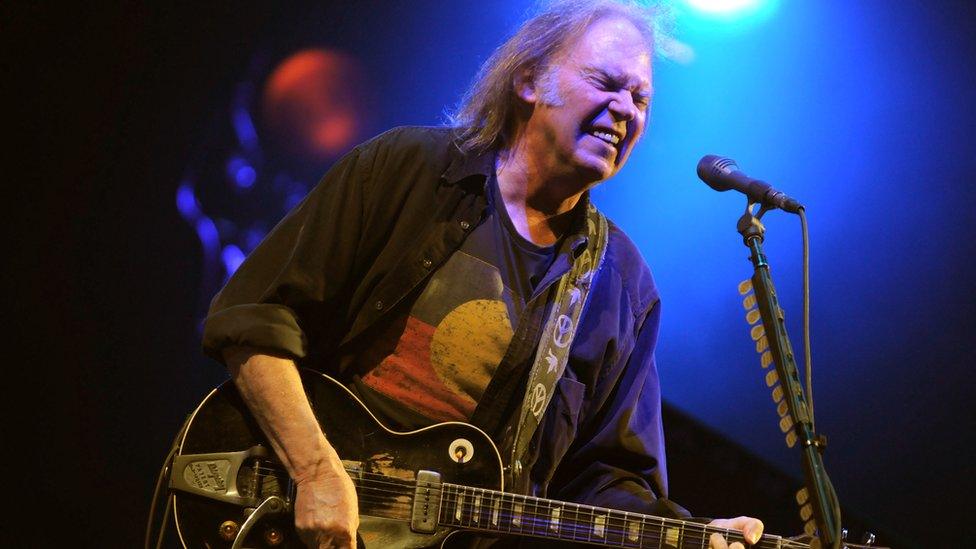
- Published30 April 2021
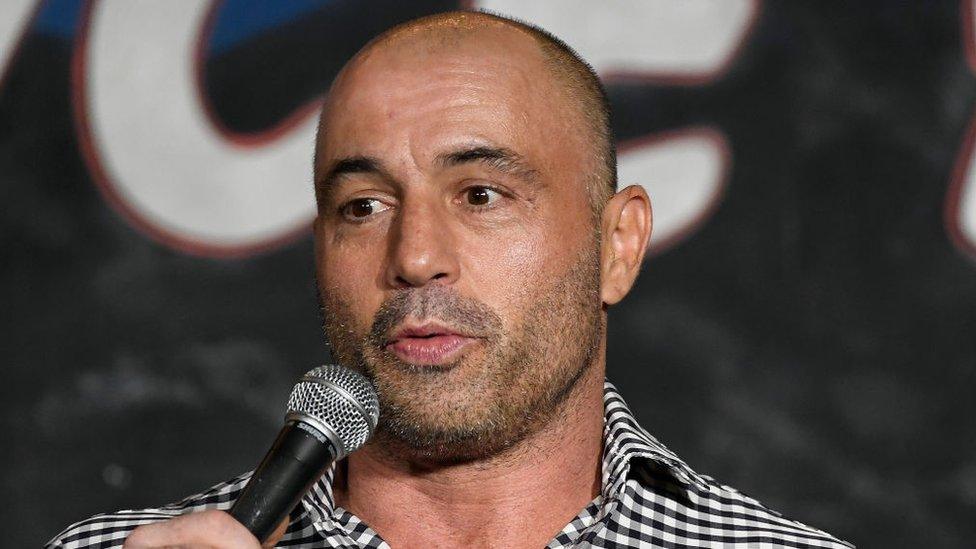
- Published5 August 2020
